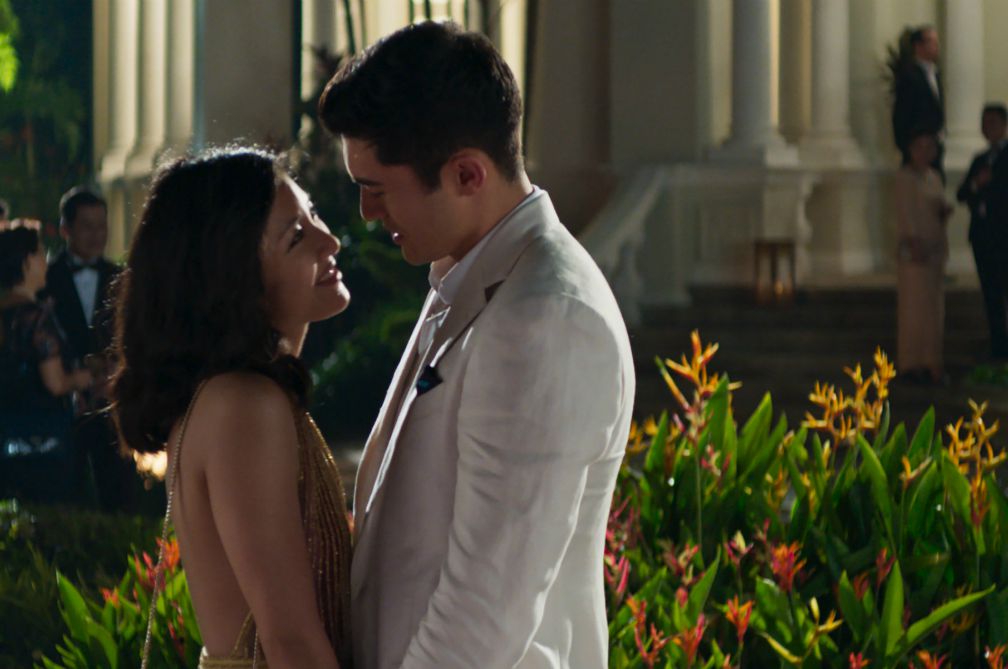
Constance Wu and Henry Golding star in a scene from the movie "Crazy Rich Asians." (CNS/Warner Bros.)
"If then you have been raised with Christ, seek the things that are above … not on things that are on earth." As the perfectly coiffed Singaporean matriarch Eleanor Young (Michelle Yeoh) reads a passage from the book of Colossians to her bible study circle of well-heeled ladies, she is interrupted by banter about a juicy piece of gossip that had literally flown in on a flurry of text messages and emojis filtered down the jet-set grapevine — jestingly referred to as Radio1Asia — all the way from New York.
Eleanor's son, the dashing bachelor Nick Young (Henry Golding), is bringing his Chinese-American girlfriend Rachel Chu (Constance Wu), an New York University economics professor, to Singapore to attend his best friend's wedding and to meet the family. Unbeknownst to Rachel, "the family" happens to be the crème de la crème of Singapore's old rich, the owners of a vast development empire.
In filmmaker Jon M. Chu's much-anticipated 2018 feature "Crazy Rich Asians," the movie adaptation of the bestselling novel by Kevin Kwan, the Young family and their ilk revel in their "Downton Abbey" world of palatial residences, gilded furniture, and a battalion of uniformed maids on call. Normally, prolonged viewing of the caprices of the moneyed class has a numbing effect on me, but Chu handles the material with a deft directorial touch. Frequently, the movie parodies itself, poking fun at the foibles of its surface-obsessed characters, and in the early scene described above, injecting a sly, ironic biblical jab at crass materialism for good measure.
The story follows a basic Hollywood rom-com template but is set in Southeast Asia, a context not often seen on the big screen. The Singapore we see here is worthy of a tourism brochure — at once hyper-modern and traditional, awash in culture, joie de vivre, and yes, oodles of money.
I was particularly thrilled to see the spotlight turned on food culture. Early on, we get delectable shots of the amazing food offerings of the famed Singapore hawker centers, favorite haunts of the late Anthony Bourdain and other foodies. In another instance, the complicated dynamics of traditional Chinese family norms find expression in the art of making dumplings. In "Crazy Rich Asians," food serves as an invitation for American audiences to virtually taste and see the richness of a unique culture on the other shore.
When she lands in Singapore, Rachel is like an innocent butterfly emerging from her American middle-class cocoon — into the awaiting mouths of snobbish, bejeweled bullfrogs. Nick's circle of friends and relatives are an outrageous lot of party animals who organize lavish private cruises and shopping sprees, while incessantly hissing about those they deem as the lower-born — read: Rachel. Nick's family is headed by his strong-willed mother Eleanor and has centuries of tradition to guard, preserve, and live by. She sternly points out that Rachel is, in fact, Chinese-American — with "American" being the operative word here — hardwired to pursue individualistic passions rather than to sacrifice personal ambitions for the sake of traditional family values. Fraught with cultural obstacles, Rachel's prospects of settling down with Nick don't look very promising, especially because she has to contend with a formidable gatekeeper. Thus, the central tension in the film's story arc crystallizes: Eleanor versus Rachel.
Malaysian superstar Yeoh, who is best remembered as noble warrior Yu Shu Lien in "Crouching Tiger, Hidden Dragon" (directed by Ang Lee, 2000) so inhabits the role of Eleanor that I find it next to impossible to imagine anyone apart from her playing the part. As complex as she is composed, Eleanor speaks volumes from what she does not say. Her expressive eyes are pools of human warmth in one instance, cold steel in another.
Yet she defies the "dragon lady" stereotype. She is driven by fierce family loyalty, not nefarious scheming. Yeoh's Eleanor is the perfect foil for Wu's convincing portrayal of Rachel, who is forthright and strong in her own right, albeit a little unsure of herself. Her identity is not set in jade; it is something she needs to navigate and stand up for.
Aside from Yeoh and Wu, the rest of the cast is first rate. The buff and bright-eyed Golding, a Malaysian-British "non-actor" whose previous experience was limited to hosting travel documentaries, acquits himself well as Singapore's most eligible bachelor. The rapper Awkwafina who plays Rachel's hilarious, over-the-top friend Peik Lin, is a scene-stealer with her perfect sense of comedic timing and attitude to spare.
Advertisement
The film is not without its flaws, and one that stood out for me was the subplot involving the character of Nick's favorite cousin Astrid (Gemma Chan), a woman who re-arranges her life to protect her husband Michael's (Pierre Png) fragile ego. I understand that Astrid's story is meant to be a sort of negative reflection of Rachel's, but it often becomes a speed bump to the main storyline and begs for a tighter edit.
There's been much talk about how "Crazy Rich Asians" is not simply a movie but a watershed moment for Asian-American representation. There's good reason for this — the last major Hollywood movie with an Asian-American story and cast was 25 years ago, Wayne Wang's "The Joy Luck Club" (it was nice to see Lisa Lu, who was part of "The Joy Luck Club," cast as Nick's grandmother).
As an Asian-American myself, watching "Crazy Rich Asians" unfold on the big screen was an uplifting experience, as though Hollywood, on this rare instance, became an Asian mirror, reflecting familiar faces from a long-ignored family album. That said, it would be unfair to interrogate the film with bigger, more compounded questions on the politics of cultural representation. The film never purports to be the definitive answer to anything. I believe that for the Asian-American community, "Crazy Rich Asians" is the gift of an open door. And judging from critical feedback and early box-office takings, this door is poised to remain open.
Besides that, there's no arguing about one thing: "Crazy Rich Asians" makes for crazy entertaining summer viewing. For anyone.
[Precious Blood Br. Antonio D. Sison is associate professor of systematic theology at Catholic Theological Union, Chicago, and author of the book The Sacred Foodways of Film (Pickwick, 2016). "Crazy Rich Asians" is currently showing in theaters from Warner Bros.]





